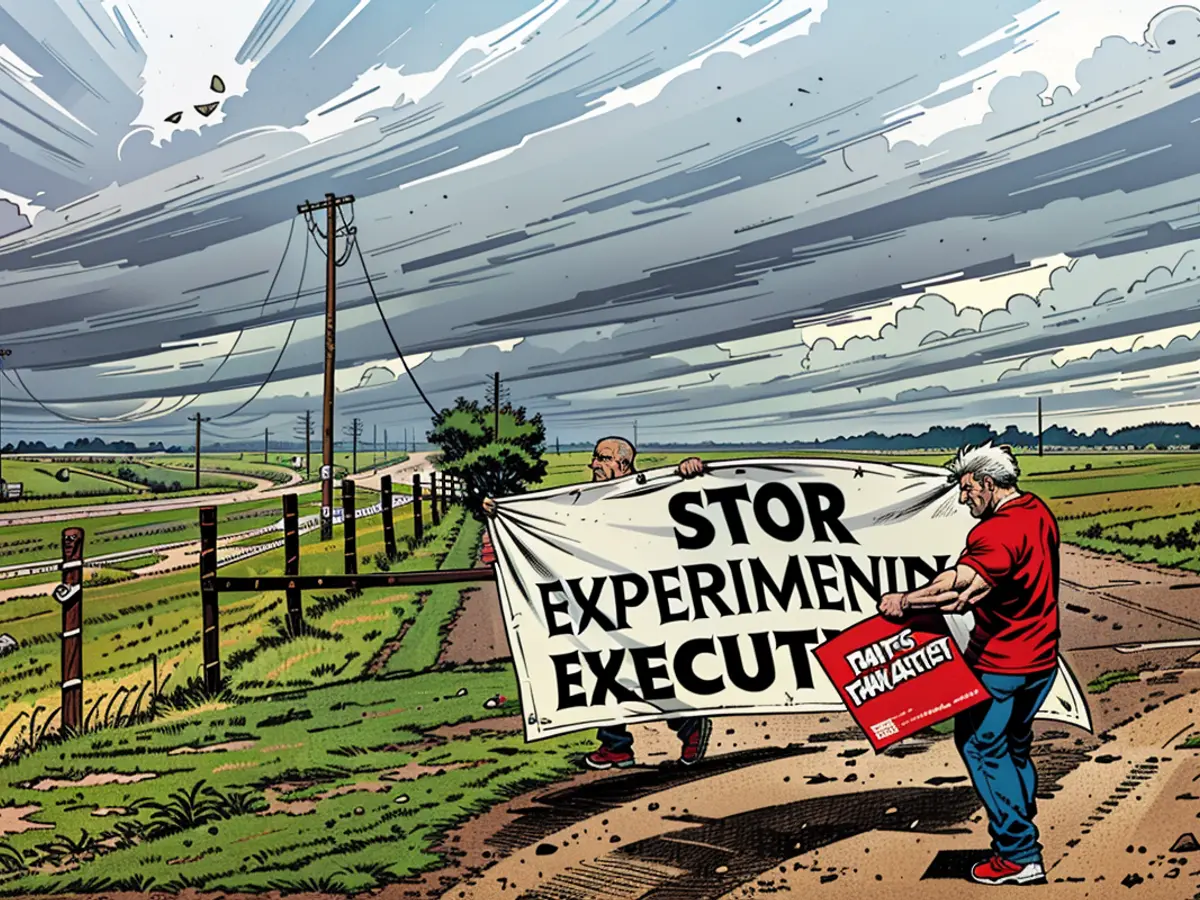The use of nitrogen hypoxia for executions isn't gaining popularity as legislative measures falter and nitrogen producers voice their objections.
Right after the winter execution of Kenneth Smith, some states were considering adopting a method called nitrogen hypoxia or something similar. Officials in each state claimed this was an alternative way for executions to go ahead when they had been on hold.
However, as the circumstances around Smith's death keep sparking discussion about nitrogen hypoxia, it has become more unclear whether other states will seriously choose nitrogen hypoxia and follow Alabama. They plan to execute another prisoner with nitrogen gas later this year.
Just one of the new laws allowing this kind of execution has already been signed: Two bills were halted by committees when their state legislatures closed this year, and one sponsor said the future of the third bill was unsure.
Robert Dunham, director of the Death Penalty Policy Project at Phillips Black, a nonprofit law firm focusing on post-conviction legal help, said, "We're not seeing many states jumping on board. I think that in states where legislators actually think about how it feels to strangle a prisoner with nitrogen gas or another gas, this method is unlikely to be accepted."
Plus, several makers of nitrogen gas have said they don't want their products used for this purpose. This reminds us of pharmaceutical companies banning their drugs from being used in lethal injections, leading states to search for an alternative. To avoid this problem, the laws proposing these types of execution methods also want to protect those involved in executions from being publicly identified.
Overall, the limited legislative efforts, resistance from gas makers, and falling support for capital punishment show nitrogen executions may not become popular amongst death penalty states in the US - at least not now.
Dunham said, "There are very few states that still want to execute prisoners. One execution doesn't prove what will happen in the future among the few states wanting to start the business of killing again. But besides the initial reaction of introducing bills in a few states, I don't think an extensive wave of attempts to expand execution methods across the country will happen."
One bill becomes law ...
Although some US states used lethal gas to execute prisoners a long time ago, nitrogen hypoxia is different. Just weeks after Smith's execution, officials in Louisiana, Ohio, and Kansas introduced bills to adopt this technique, together with Nebraska, where a previous bill was thought about before Smith's execution.
Out of these states, only Louisiana signed a bill - HB 6 - signed by their governor, Jeff Landry, during a special session in February. This bill included a provision allowing the usage of nitrogen gas. The bill's author, GOP state Rep. Nicholas Muscarello, said he expected this legislation to help with bringing back executions in his state, which hasn't killed anyone since 2010. But he mentioned most executions would likely be carried out through lethal injection instead.
However, in the normal session, it was clear that HB 6 wouldn't work without a battle. A separate bill, SB 430, proposed by Democrat state Sen. Katrina Jackson-Andrews, aimed to erase the nitrogen gas provision while keeping the others.
But Jackson-Andrews, who didn't reply to CNN's request for an interview, had the support of a group called Jews Against Gassing. The group is against gas executions since they remind them of the Holocaust. Here, Jews were killed by Nazi Germany using gas.
One member, Jacquelyn Stern, 70, said, "When this came up, it made me feel emotional. Being connected to Holocaust survivors and going to school with their kids, they have all been severely impacted. It goes against what a civilized society should be, to want to gas people like Nazi Germany did."
SB 430 passed the Louisiana state Senate with support from both parties. But when it was put in front of the state House Committee on Criminal Justice, they rejected it, causing Stern to feel disheartened, powerless, and unheard.
### Ohio's bill seems to be the only remaining option

There's only one other possible bill that could become law in this category in the state of Ohio. Two Republican state reps - Phil Plummer and Brian Stewart - introduced a bill, HB 392, with the backing of the state's GOP attorney general who believes nitrogen hypoxia can bring "closure" to victims after years of the state struggling to get the drugs needed for lethal injections and the ensuing death penalty moratorium.
Plummer also saw this as a way for the state to execute violent killers, and he told CNN that this was following Alabama's lead with nitrogen hypoxia as another execution method.
"We decided to follow suit with Alabama's nitrogen hypoxia as another option," he said. "The important thing here is that we're not changing the death penalty. It's already in the statutes. We're just giving the government another option."
The bill is currently before the House Government Oversight Committee. They've held two hearings: one for the sponsors and another for the proponents. The third, for those opposed, is yet to be scheduled.
During the first hearing, Plummer and Stewart were questioned by committee members - even some Democrats referred to Alabama's execution of Smith and the ensuing debate over whether it was humane.
Ahead of Smith's execution, concerns were raised that elements in Alabama's protocol, which have been heavily redacted, could cause prolonged suffering. Alabama argued that nitrogen hypoxia was the most humane execution method.
After Smith's execution, both sides pointed to it as evidence supporting their claims. Alabama's attorney general called it "textbook," while critics pointed to witness accounts that Smith shook and writhed on the gurney for minutes before his death and did not slip into unconsciousness as the state claimed he would.
Plummer dismissed this criticism, telling CNN, "The critics always complain that it's inhumane. That's their talking point."
"We don't want people to suffer. But at the end of the day, it's the law, and it's our job to enact the law," he said, adding he was open to listening about alternatives.
It's not clear if Ohio's HB 392 will pass. Plummer attributed the uncertainty to division within the state's Republican caucus following a tough House speaker's race.
On the other hand, Kansas and Nebraska's legislatures both adjourned without passing their respective bills, and each would need to be reintroduced to be considered again.
Nebraska's LB 970 is labeled "indefinitely postponed." Its sponsor, Republican Senator Loren Lippincott, declined an interview but said he had not yet decided whether to reintroduce the legislation next year.
On a separate note, Kansas' HB 2782, which adds "hypoxia" as an execution method without specifying nitrogen gas, had a hearing before the state House Judiciary Committee but appeared to go no further. GOP Kansas Attorney General Kris Kobach, whose office requested the bill, will try to have a similar one introduced next year, a spokesperson said.
Some gas manufacturers are against it ...
![Ohio Republican Attorney General Dave Yost appears alongside Representatives Phil Plummer and Brian Stewart at a press conference in January presenting legislation for adopting nitrogen gas executions. [
]() Republican Ohio Attorney General Dave Yost is flanked by state Reps. Phil Plummer, left, and Brian Stewart at a news conference in January announcing legislation to adopt nitrogen gas executions.](https://cdn.aussiedlerbote.de/content/images/2024/06/08/322793/jpeg/4-3/1200/75/republican-ohio-attorney-general-dave-yost-is-flanked-by-state-reps-phil-plummer-left-and-brian-stewart-at-a-news-conference-in-january-announcing-legislation-to-adopt-nitrogen-gas-executions.webp)
States vying fornitrogen executions could face another obstacle: lacking the resources to carry them out.
One of the advantages of nitrogen hypoxia has been that nitrogen gas is abundant on Earth and is commonly used in many industries for various applications.
But some companies certified by the US Food and Drug Administration to produce nitrogen gas for human use have told CNN they're opposed or wouldn't allow their products to be used for executions, as first reported by The Guardian.
For instance, AirGas, owned by French company Air Liquide, "has not and will not supply nitrogen or other inert gases to induce hypoxia for the purpose of human execution," it said in a statement.
The company stated that it had publicly expressed this stance since 2019 and hasn't changed its view.
Similarly, Linde, a European company, "has a long-standing policy prohibiting the sale of our gases for use as an asphyxiant applied to humans," it said in a statement to CNN. "We do not knowingly sell to third parties nor offer bids on contracts seeking to secure gases for this purpose."
And Air Products told CNN they'd "established prohibited end uses for our products, which includes the use of any of our industrial gas products for the intentional killing of any person (including nitrogen hypoxia)."
Sarat connected corporate objections, whether they're producing nitrogen or medications, to the ongoing "time of country-wide evaluation of capital punishment." This isn't just about decreasing executions and death sentences but also a drop in public support for the death penalty. In November 2020, a Gallup Poll revealed only 47% of Americans felt the death penalty was fairly given, with 53% supporting it overall – far beneath the 80% peak observed in 1994.
Sarat stated, "As uncertainty rises about capital punishment, as individuals start to reconsider whether this is a good idea, companies involved in the manufacture of pharmaceuticals or nitrogen won't want their products affiliated with the American death penalty." He added, "Would it shock me if supply worries arose? No, it wouldn't."
While states are contemplating nitrogen hypoxia, they've integrated provisions to maintain suppliers' identities confidential. Louisiana's HB 6 added an amendment ensuring the "utmost confidentiality of the identifying information of any individual, organization, business, or entity directly or indirectly involved in the execution of a death sentence" in their state. This "confidentiality provision" surpasses any other law concerning public disclosure in the state.
HB 6 also mentions that information about purchases for executions would be passed on to the state inspector general, who would examine the information and authenticate the purchases.
Similarly, Ohio's HB 392 expands existing protections, hindering the disclosure of "execution identifying information" to anyone who produces, distributes, prepares, or administers a drug or gas for an execution.
Plummer explained to CNN that this provision was designed to avoid the same procurement difficulties as Ohio experienced with lethal injection drugs and protect suppliers from the risks of public retaliation.
"We're simply trying to provide an additional layer of protection to the producers of the substance we need," he said, "since cancel culture is definitely thriving."

Eva Roytburg of CNN also contributed to this piece.
Read also:
Despite the legislation passing in Louisiana, there have been efforts to halt the use of nitrogen hypoxia in other states. For instance, a bill in Ohio, HB 392, has been introduced and is currently before the House Government Oversight Committee, but it remains uncertain if it will pass due to division within the state's Republican caucus.
Furthermore, opposition from gas manufacturers has emerged as another obstacle for states considering nitrogen hypoxia. Companies like AirGas, Linde, and Air Products have expressed their refusal to supply nitrogen gas for executions, citing ethical concerns and the changing landscape of public opinion on capital punishment.








